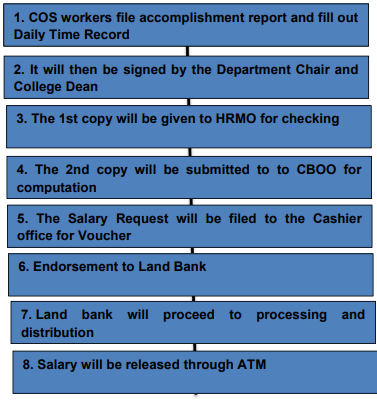Investigative
Beyond payrolls: An inkless contract of uncertainty
by Liezhel joy ramos|Category: Investigative Journalism |Originally published as an Entry to Philippine Journalism Research Conference 2024
DESCRIPTION PAGE
Benguet State University (BSU) is among the ranked top Higher Education Institution
(HEIs) in the Philippines, according to the ranking system of the Cybermetrics Lab, a renowned
research group from the Consejo Superior de Investigaciones Cientificas (CSIC)- the largest
public research institution in Spain.
Since its establishment in 1916, it has orchestrated its rise as an agricultural school in
the highlands of the Cordillera Region, providing its constituents a wide opportunity and better
state of improving their lives and livelihood.
On the other hand, honoring its profile is an attribution to its workforce and operational
capacity should be a detailed-focus priority rather than a result-driven endeavor. Although salary
deferment is a chronic occurrence in the Philippines; impropriety of others in the long chain of
labor force has been permissible as reflected by those of higher offices, thus, what counts is to
what extent those in the bottom of the long chain grieve for increased tolerance.
In light of this occurrence, it is the paper management process that requires
conscientious quality control. A two-month delayed salary for the BSU-COS workers was their
amount of weariness for those two months doubled. As this just doesn’t affect their performance
as an employee, it also directly addressed their personal needs as thriving individuals. They
may be the bottom of the food chain of the professional world, but most of these laborers are
also an embodiment of the area of expertise BSU will attain for the years to come.
This may be a usual occurrence in many private and government institutions all
throughout the Philippines, but this isn’t at all usual but rather it is all that is unusual; a deformity
in the

BSU students convene in the University closed gymnasium as part of the student government elections, a glimpse of the population of the institution.
Commission on Audit (COA) defines COS as the engagement of the services of
a person, private firm, non-governmental agency, or international organization to
undertake a specific work or job requiring special or technical skills not organization in
the agency to be accomplished within a specific period not exceeding one year.
In terms of national law, number 7.5 of COA- Department of Budget and
Management (DBM) joint circular 2 series of 2020, states that
“The services of COS
workers are not covered by Civil Service laws, rules, and regulations, thus, not
creditable as government service.”
This means that they won’t be able to enjoy the benefits being received by
government employees, which includes leave, Personnel Economic Relief Allowance, Representation and Transportation Allowances, and other bonuses and incentives.”
As a result, opportunities are increasingly hampered along with heightened
vulnerability of COS workers to labor rights violation and possible delays in their salaries, compensations, and privileges. A sight that is alarmingly normal inside BSU for so many
years and a soundless appeal for system change COS workers have been crying foul
for the longest time.
A CLOSER LOOK
Sir Kennedy, not his real name, is among the many COS instructors who has
experienced a delay in salary since January this year. In the same way as other COS
workers, he is yet to sign an official contract of service to solidify his position in the
university even when he is already working and conducting class sessions along with
other responsibilities that are beyond the contract of service.
“That has been the culture within the government that even though you do not
yet have the official job order to work, you will start working even though your contract is
not yet official,”

BSU students convene in the University closed gymnasium as part of the student government elections, a glimpse of the population of the institution.
Kennedy added that he had already observed increasing figures of his co- workers who have no choice but to depend on loaning money, especially those that
have immediate needs concerning their family’s basic needs, health and other matters
related to finance. According to him, it is already a struggle to even find a place where
to loan money that would be enough to sustain his everyday living expenses while
waiting for their salary budget to be approved and released by the administration.
“Some of our colleagues and fellow COS teachers focused instead on their side
hustles since they get direct money there instead of only waiting for the release of their
salary,” Kennedy shared.
BSU’s situation is a mere testament of how our country, in general, normalizes
job contractualization to the point that it creeps in every single nook and cranny of our
employment industry. It is a reality that many adults are in a constant pressure of
immediately seeking for a job to suffice their basic needs as well as their familial
necessities, which is why contractual jobs are the common answers to this predicament.
In the Philippines alone, Rep. France Castro from the Alliance of Concerned
Teachers (ACT) noted a total of 648,215 government workers under Contract of Service
last June 30, 2022 from the Inventory of Government Human Resources, published
under inquirer.net. The aforementioned figures continue to rise each year. Contractualization is also a recurring phenomena even outside the country. According to Focus Global South Dispatch, countries like Cambodia, India, Pakistan, and Vietnam also have a notable figure of temporary and wage workers which is more
commonly termed as “Non-standard Employment” or NSE.
In light of this, the International Labour Organization (ILO) identified factors that
are contributing to the inflation of NSE, one of which are the changes taking place
around the globe brought about by globalization along with social change, as well as the
emerging role of women in all walks of life that is adding to the world’s temporary or
contractual labor force.
Taking into account the recognized atrocity of the contractualization culture in the
Philippines, its effect on the micro perspective community projects a prevalent
vulnerability for worker exploitation. In this case, when one walks through being a COS
worker, a side hustle is a must.
Kennedy added that COS teachers do other jobs to get money rather than
waiting for the salary that has no assurance resulting in them having less time to
prepare for their lessons and lectures.
NO PROOF OF CONTRACT
Accordingly, one of the prime reasons that stirred the delay of salary release for
the past months, were the Job orders or COS of the said working body that was not
immediately notarized due to the delays in the approval of the Board of Regents (BOR)
regarding the Program of Receipts of Expenditures (PRE) stated for the year 2024.
PRE is a procedure established to provide a better view of how the annual
budget proposal will be prepared, it also presents the projected income from tuition fees
and other charges, fiduciary funds, as well as the yield from the different income
generating projects of the university.
Due to the previous circumstance, COS workers had no leverage to demand the
right to salary since they are not yet fully part of BSU because of their unnotarized job
contracts. This puts them in a tight spot with no legal basis when worse comes to worst
in terms of legality.
Kennedy additionally expressed that although the delay of salary does not affect
his way of handling his students, it somehow affects his energy in coming to work.
THE BUDGETING SIDE
Estrelita Malano Daclan, Supervising Administrative Officer-Budgeting Office, stated that they prepared their PRE as early as December. The Finance executive
however requested some requirements of the actual cash balance which can only be
sourced out by January resulting in the delay of the PRE.
The Budgeting Office prepared the PRE in January, but the schedule of the
presentation to the Finance Executive Committee that is prerequisite before it reaches
the BOR for its approval underwent numerous delays as well.
Daclan noted that they had tried to plan the PRE as early as September during
the last PRE but due to the requirements of the BOR to have the closest estimates
possible, it slowed down the process of the PRE.
Furthermore, in a statement made by Dr. Felipe Salaing Comila, University
President, mentioned that he underwent a dialogue with the BOR last January in Manila
for the approval of the requested funds for the COS. As a result, the salary was
released sometime between February to March 2024 yet the financial crisis of BSU
remains in peril as more COS workers still haven’t received their salary until this day.
“Sana naman yung aspect ng patience, magtiis muna yung mga COS. Kalakaran
naman talaga sa government at kahit anong organization na hindi naman basta
pwedeng magpa sweldo na walang disbursement authority,” remarked one budgeting
staff during the interview.
Restating that even the PRE was approved, it was still a projection. For that case,
there is no actual cash payment which continues the ladder process wherein there is a
need to request another request release from the DBM.
As the the toxic virtue of patience homogenize all unofficial statements the
administration has been adamantly advising to its workers, queries only piled up burying
the bottom line of what this controversy was all about in the first place: just and humane
compensation coupled with strict compliance to the Article 103 of the Labor Code of the
Philippines which highlights COS rights in the proper time of payment of their salary

A comprehensive outline of how salary flows within BSU
IN STUDENTS PARADIGM
It is no doubt that COS workers make up most of the workforce population of
BSU, from classrooms to corridors, from offices to research extensions, the
repercussions of this system delay undoubtedly kindled a ripple effect of missed
opportunities, unhealthy working environment, and an impediment of academic
endeavors all over the institution.
Some students with COS instructors are already expressing their concerns in
connection to the issue about the delay in salaries for COS workers.
Mary, not her real name, is a student of COS instructors in her college
department, she noted the changes in the behavior of her instructors in teaching their
classes.
“I felt like my instructors, who are COS workers, are not that motivated to do their
job, we even sometimes experience not having a class for a certain instructor for a
week,” Mary expressed.
This scenario for most students is not that bothersome because the problem is
not directly affecting them . For other students like Mary, however, there is a realization
that this could also be a problem for them due to the affected performance of their
instructors and the recognition of the truth about the economic landscape of BSU and
the government

BSU workers thoroughly screening the list of requirements for aspiring scholars of BSU
In the case of BSU, the existence of this subtle exploitation did not only result in
financial burdens and emotional distress among COS workers but few of them
reportedly resigned as they could not afford to waste more time in a long waiting game
that won’t assure them anything.
Ryan, not his real name, a COS instructor, shared that few of the colleagues and
workmates he knew previously resigned from the university and major part of the
reason is attributed to the unjust delays of salary, a missed opportunity to earn for a
living once more because of exploitation.
Above all, this was never solely about the long-standing issue of BSU’s financial
crisis and mismanagement, but an underlying issue that underscores the institution’s
way of handling its workforce. It is also a clear reflection of the leadership of the current
administration which has faced countless controversies evident in the local media for
months already.
Long enough they had endured the uncertainties of an inkless contract just to
serve as the front liners in our pursuit towards ensuring quality education we all ought to
have, COS workers deserve more and safer corridors where a labor landscape free
from economic exploitation exists
